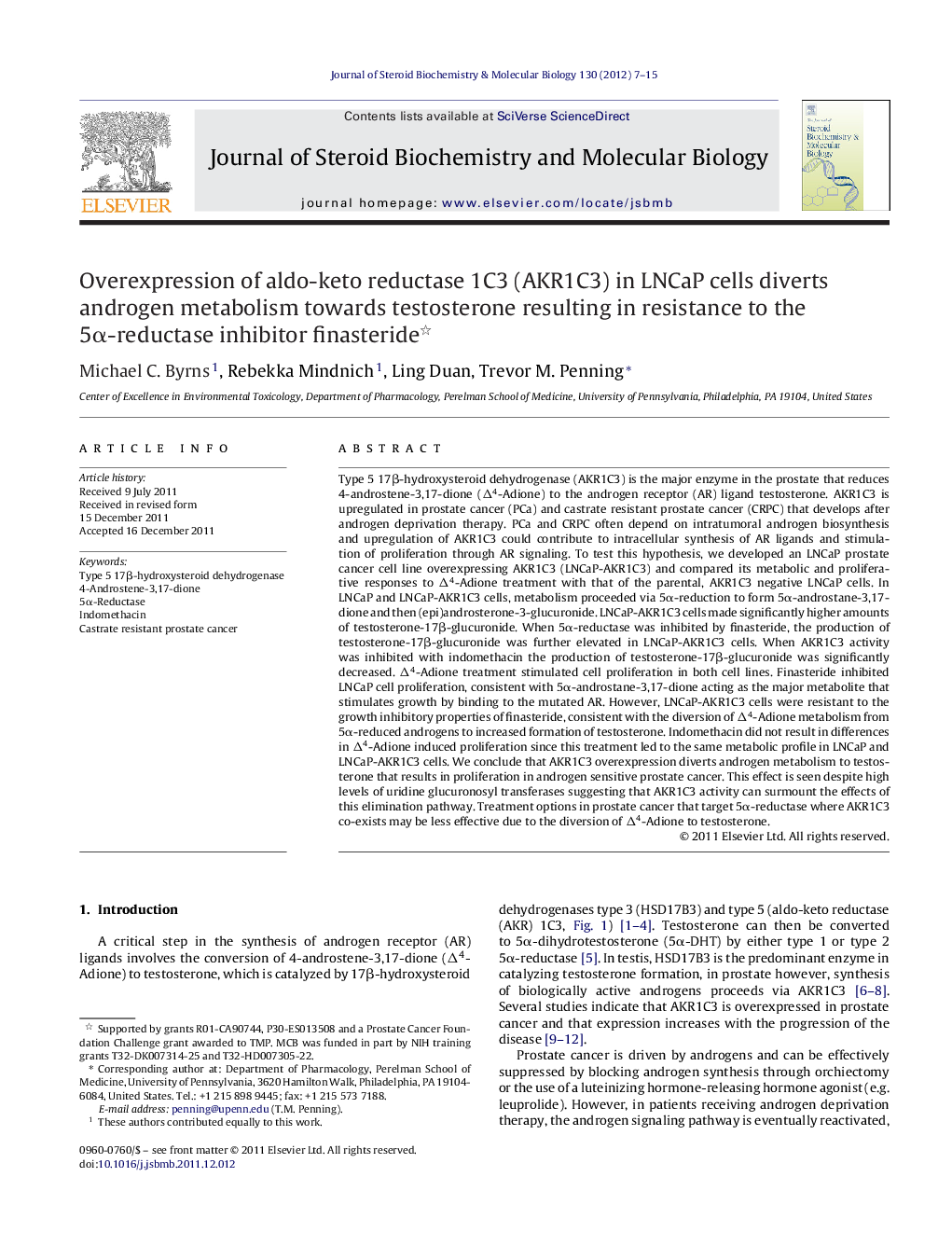| کد مقاله | کد نشریه | سال انتشار | مقاله انگلیسی | نسخه تمام متن |
|---|---|---|---|---|
| 1991673 | 1541023 | 2012 | 9 صفحه PDF | دانلود رایگان |

Type 5 17β-hydroxysteroid dehydrogenase (AKR1C3) is the major enzyme in the prostate that reduces 4-androstene-3,17-dione (Δ4-Adione) to the androgen receptor (AR) ligand testosterone. AKR1C3 is upregulated in prostate cancer (PCa) and castrate resistant prostate cancer (CRPC) that develops after androgen deprivation therapy. PCa and CRPC often depend on intratumoral androgen biosynthesis and upregulation of AKR1C3 could contribute to intracellular synthesis of AR ligands and stimulation of proliferation through AR signaling. To test this hypothesis, we developed an LNCaP prostate cancer cell line overexpressing AKR1C3 (LNCaP-AKR1C3) and compared its metabolic and proliferative responses to Δ4-Adione treatment with that of the parental, AKR1C3 negative LNCaP cells. In LNCaP and LNCaP-AKR1C3 cells, metabolism proceeded via 5α-reduction to form 5α-androstane-3,17-dione and then (epi)androsterone-3-glucuronide. LNCaP-AKR1C3 cells made significantly higher amounts of testosterone-17β-glucuronide. When 5α-reductase was inhibited by finasteride, the production of testosterone-17β-glucuronide was further elevated in LNCaP-AKR1C3 cells. When AKR1C3 activity was inhibited with indomethacin the production of testosterone-17β-glucuronide was significantly decreased. Δ4-Adione treatment stimulated cell proliferation in both cell lines. Finasteride inhibited LNCaP cell proliferation, consistent with 5α-androstane-3,17-dione acting as the major metabolite that stimulates growth by binding to the mutated AR. However, LNCaP-AKR1C3 cells were resistant to the growth inhibitory properties of finasteride, consistent with the diversion of Δ4-Adione metabolism from 5α-reduced androgens to increased formation of testosterone. Indomethacin did not result in differences in Δ4-Adione induced proliferation since this treatment led to the same metabolic profile in LNCaP and LNCaP-AKR1C3 cells. We conclude that AKR1C3 overexpression diverts androgen metabolism to testosterone that results in proliferation in androgen sensitive prostate cancer. This effect is seen despite high levels of uridine glucuronosyl transferases suggesting that AKR1C3 activity can surmount the effects of this elimination pathway. Treatment options in prostate cancer that target 5α-reductase where AKR1C3 co-exists may be less effective due to the diversion of Δ4-Adione to testosterone.
Figure optionsDownload as PowerPoint slideHighlights
► AKR1C3 is one of the most overexpressed genes in castrate resistant prostate cancer.
► AKR1C3 was stably transfected into LNCaP cells which are AKR1C3 null and its effect on Δ4-Adione metabolism and Δ4-Adione mediated cell growth was studied.
► LNCaP-AKR1C3 cells showed significant conversion of Δ4-Adione to testosterone-17β-glucuronide that was inhibited by indomethacin.
► Proliferation of LNCaP-AKR1C3 cells stimulated by Δ4-Adione was resistant to finasteride inhibition consistent with a re-direction of metabolism to testosterone.
► When AKR1C3 and 5α-reductase co-exist in prostate cancer the use of 5α-reductase inhibitors may be deleterious due to the unintended re-diversion of Δ4-Adione to testosterone.
Journal: The Journal of Steroid Biochemistry and Molecular Biology - Volume 130, Issues 1–2, May 2012, Pages 7–15